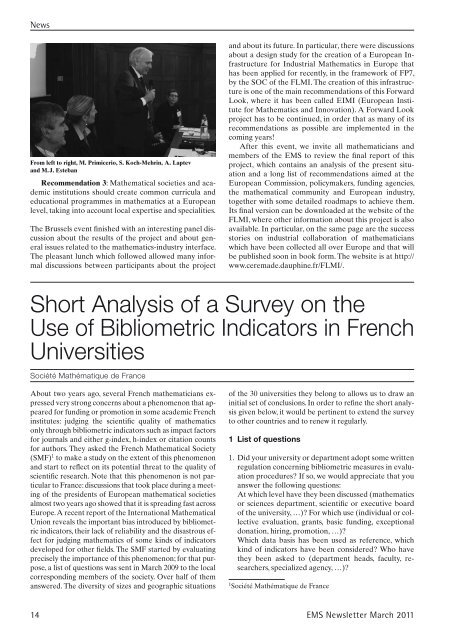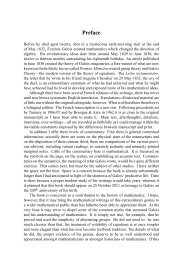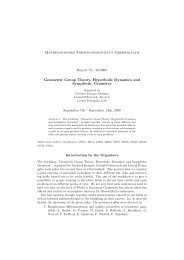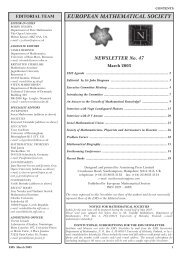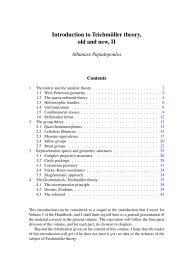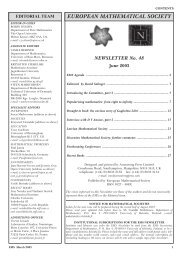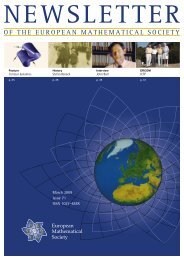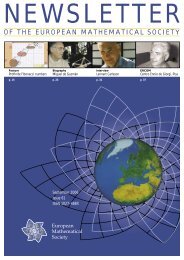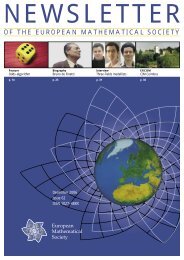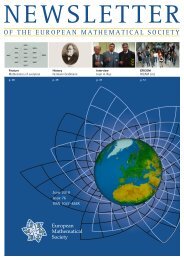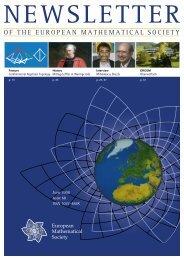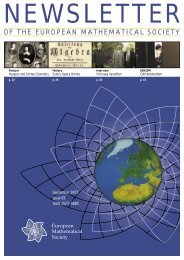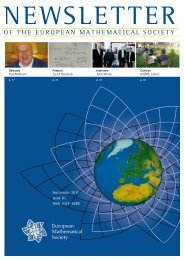Bulletin of Mathematical Sciences - European Mathematical Society ...
Bulletin of Mathematical Sciences - European Mathematical Society ...
Bulletin of Mathematical Sciences - European Mathematical Society ...
You also want an ePaper? Increase the reach of your titles
YUMPU automatically turns print PDFs into web optimized ePapers that Google loves.
News<br />
From left to right, M. Primicerio, S. Koch-Mehrin, A. Laptev<br />
and M. J. Esteban<br />
Recommendation 3: <strong>Mathematical</strong> societies and academic<br />
institutions should create common curricula and<br />
educational programmes in mathematics at a <strong>European</strong><br />
level, taking into account local expertise and specialities.<br />
The Brussels event finished with an interesting panel discussion<br />
about the results <strong>of</strong> the project and about general<br />
issues related to the mathematics-industry interface.<br />
The pleasant lunch which followed allowed many informal<br />
discussions between participants about the project<br />
About two years ago, several French mathematicians expressed<br />
very strong concerns about a phenomenon that appeared<br />
for funding or promotion in some academic French<br />
institutes: judging the scientific quality <strong>of</strong> mathematics<br />
only through bibliometric indicators such as impact factors<br />
for journals and either g-index, h-index or citation counts<br />
for authors. They asked the French <strong>Mathematical</strong> <strong>Society</strong><br />
(SMF) 1 to make a study on the extent <strong>of</strong> this phenomenon<br />
and start to reflect on its potential threat to the quality <strong>of</strong><br />
scientific research. Note that this phenomenon is not particular<br />
to France: discussions that took place during a meeting<br />
<strong>of</strong> the presidents <strong>of</strong> <strong>European</strong> mathematical societies<br />
almost two years ago showed that it is spreading fast across<br />
Europe. A recent report <strong>of</strong> the International <strong>Mathematical</strong><br />
Union reveals the important bias introduced by bibliometric<br />
indicators, their lack <strong>of</strong> reliability and the disastrous effect<br />
for judging mathematics <strong>of</strong> some kinds <strong>of</strong> indicators<br />
developed for other fields. The SMF started by evaluating<br />
precisely the importance <strong>of</strong> this phenomenon; for that purpose,<br />
a list <strong>of</strong> questions was sent in March 2009 to the local<br />
corresponding members <strong>of</strong> the society. Over half <strong>of</strong> them<br />
answered. The diversity <strong>of</strong> sizes and geographic situations<br />
and about its future. In particular, there were discussions<br />
about a design study for the creation <strong>of</strong> a <strong>European</strong> Infrastructure<br />
for Industrial Mathematics in Europe that<br />
has been applied for recently, in the framework <strong>of</strong> FP7,<br />
by the SOC <strong>of</strong> the FLMI. The creation <strong>of</strong> this infrastructure<br />
is one <strong>of</strong> the main recommendations <strong>of</strong> this Forward<br />
Look, where it has been called EIMI (<strong>European</strong> Institute<br />
for Mathematics and Innovation). A Forward Look<br />
project has to be continued, in order that as many <strong>of</strong> its<br />
recommendations as possible are implemented in the<br />
coming years!<br />
After this event, we invite all mathematicians and<br />
members <strong>of</strong> the EMS to review the final report <strong>of</strong> this<br />
project, which contains an analysis <strong>of</strong> the present situation<br />
and a long list <strong>of</strong> recommendations aimed at the<br />
<strong>European</strong> Commission, policymakers, funding agencies,<br />
the mathematical community and <strong>European</strong> industry,<br />
together with some detailed roadmaps to achieve them.<br />
Its final version can be downloaded at the website <strong>of</strong> the<br />
FLMI, where other information about this project is also<br />
available. In particular, on the same page are the success<br />
stories on industrial collaboration <strong>of</strong> mathematicians<br />
which have been collected all over Europe and that will<br />
be published soon in book form. The website is at http://<br />
www.ceremade.dauphine.fr/FLMI/.<br />
Short Analysis <strong>of</strong> a Survey on the<br />
Use <strong>of</strong> Bibliometric Indicators in French<br />
Universities<br />
Société Mathématique de France<br />
<strong>of</strong> the 30 universities they belong to allows us to draw an<br />
initial set <strong>of</strong> conclusions. In order to refine the short analysis<br />
given below, it would be pertinent to extend the survey<br />
to other countries and to renew it regularly.<br />
1 List <strong>of</strong> questions<br />
1. Did your university or department adopt some written<br />
regulation concerning bibliometric measures in evaluation<br />
procedures? If so, we would appreciate that you<br />
answer the following questions:<br />
At which level have they been discussed (mathematics<br />
or sciences department, scientific or executive board<br />
<strong>of</strong> the university, …)? For which use (individual or collective<br />
evaluation, grants, basic funding, exceptional<br />
donation, hiring, promotion, …)?<br />
Which data basis has been used as reference, which<br />
kind <strong>of</strong> indicators have been considered? Who have<br />
they been asked to (department heads, faculty, researchers,<br />
specialized agency, …)?<br />
1 Société Mathématique de France<br />
14 EMS Newsletter March 2011


